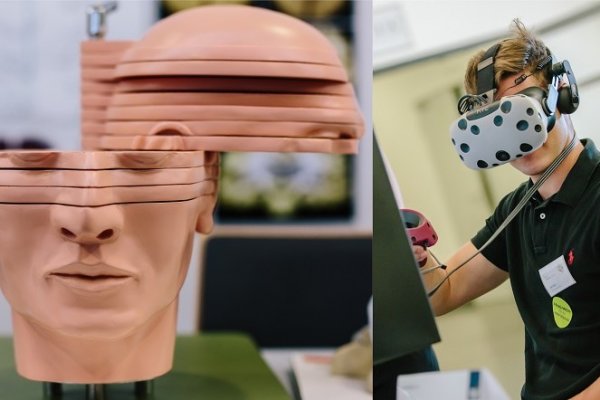19.07.2022

A day with a focus on Bochum’s neuroscience with lectures, information stands and activities: 14.09.2022, 1pm to 5pm, RUB Conference Center.
Participation is free of charge. Please confirm your attendance via Sfb874-pr@rub.de
Get into conversation with the neuroscientists at the Ruhr-Universität Bochum:
Why is chilli burning and why is mint cold? The skin is the largest human organ and we constantly perceive our surroundings with it. Functional disorders or diseases that impair the sensation of various temperature and touch stimuli can have consequences for our everyday functions – even leading to the development of nerve pain. With tangible examples relevant to everyday life, various aspects of temperature, touch and pain perception are explained in a comprehensible way and can be experienced vividly with small experiments.
How do stress hormones influence our memories? Find out from the researchers of the Department of Cognitive Psychology. Gain new insights into the way our brain functions under stress and learn how to objectively measure stress reactions. You want to know what ice water, math problems and people in white coats have to do with all this? Find out and slip into the role of a test person yourself at the Brain Day.
Why are we able to classify unknown objects into meaningful groups? In order to find an answer to this question, members of the working group “Neural Foundations of Learning” have developed abstract categories. Try out for yourself how well you can classify the so-called “RUBubbles” and find out what we can learn from corvids on this topic.
The Knappschaftskrankenhaus Bochum is researching, amongst other things, how “virtual reality” can be used to diagnose or rehabilitate movement impairments – caused, for example, by Parkinson’s disease or stroke. Test your motor skills with 3D video glasses and motion sensors during a virtual visit to a computer-generated reality.
Scents can evoke memories and trigger feelings. Why is this so? Join our scientists from the Department of Neurophysiology of the Faculty of Medicine in the fascinating world of scents. Discover which processes take place in the brain when the nose perceives scent molecules and how olfactory perceptions influence our memory.
Where are hippocampus, cerebellum, or pituitary gland? Members of the Institute of Anatomy, Department of Cytology, will help you get oriented in the brain. Discover the most astonishing human organ under the microscope, through exhibits, and diagrams.
The Faculty of Sport Science presents a hands-on course on the topic of “Sensorimotor Coordination and Information Processing”: Test your reaction ability, hand strength and muscle activity or your ability to balance. Get to know current wearables and APPs in this field. Or try exercises to improve coordination such as the “balance trainer” or the “coordination ladder”. Learn how sports science scientifically examines movement and coordination.
www.sfb874.ruhr-uni-bochum.de/brain-day-page
A day with a focus on Bochum’s neuroscience with lectures, information stands and activities: 14.09.2022, 1pm to 5pm, RUB Conference Center.
Participation is free of charge. Please confirm your attendance via Sfb874-pr@rub.de
Get into conversation with the neuroscientists at the Ruhr-Universität Bochum:
Why is chilli burning and why is mint cold? The skin is the largest human organ and we constantly perceive our surroundings with it. Functional disorders or diseases that impair the sensation of various temperature and touch stimuli can have consequences for our everyday functions – even leading to the development of nerve pain. With tangible examples relevant to everyday life, various aspects of temperature, touch and pain perception are explained in a comprehensible way and can be experienced vividly with small experiments.
How do stress hormones influence our memories? Find out from the researchers of the Department of Cognitive Psychology. Gain new insights into the way our brain functions under stress and learn how to objectively measure stress reactions. You want to know what ice water, math problems and people in white coats have to do with all this? Find out and slip into the role of a test person yourself at the Brain Day.
Why are we able to classify unknown objects into meaningful groups? In order to find an answer to this question, members of the working group “Neural Foundations of Learning” have developed abstract categories. Try out for yourself how well you can classify the so-called “RUBubbles” and find out what we can learn from corvids on this topic.
The Knappschaftskrankenhaus Bochum is researching, amongst other things, how “virtual reality” can be used to diagnose or rehabilitate movement impairments – caused, for example, by Parkinson’s disease or stroke. Test your motor skills with 3D video glasses and motion sensors during a virtual visit to a computer-generated reality.
Scents can evoke memories and trigger feelings. Why is this so? Join our scientists from the Department of Neurophysiology of the Faculty of Medicine in the fascinating world of scents. Discover which processes take place in the brain when the nose perceives scent molecules and how olfactory perceptions influence our memory.
Where are hippocampus, cerebellum, or pituitary gland? Members of the Institute of Anatomy, Department of Cytology, will help you get oriented in the brain. Discover the most astonishing human organ under the microscope, through exhibits, and diagrams.
The Faculty of Sport Science presents a hands-on course on the topic of “Sensorimotor Coordination and Information Processing”: Test your reaction ability, hand strength and muscle activity or your ability to balance. Get to know current wearables and APPs in this field. Or try exercises to improve coordination such as the “balance trainer” or the “coordination ladder”. Learn how sports science scientifically examines movement and coordination.
www.sfb874.ruhr-uni-bochum.de/brain-day-page